
Find Help
More Items From Ergsy search
-

How do climate changes affect mosquito-borne diseases in the UK?
Relevance: 100%
-

Is there a season when mosquito-borne diseases are more likely in the UK?
Relevance: 93%
-
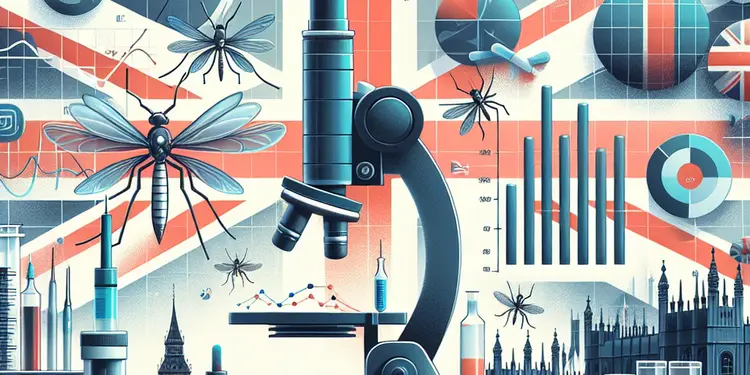
What research is being conducted on mosquito-borne diseases in the UK?
Relevance: 92%
-
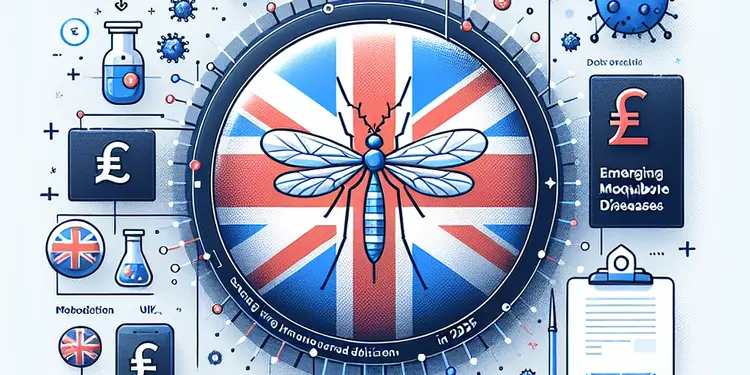
Are there any new mosquito-borne diseases emerging in the UK in 2025?
Relevance: 90%
-

What regions of the UK are most affected by mosquito-borne diseases?
Relevance: 89%
-
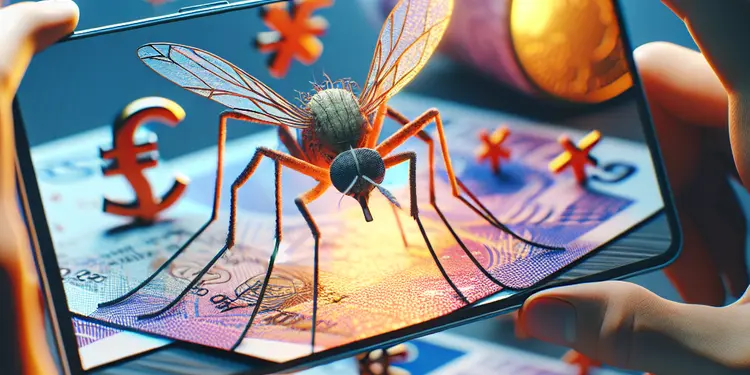
What symptoms should I watch for if I suspect a mosquito-borne disease?
Relevance: 76%
-

Are climate changes affecting mosquito populations in the UK?
Relevance: 76%
-

Do UK mosquitoes carry diseases?
Relevance: 68%
-
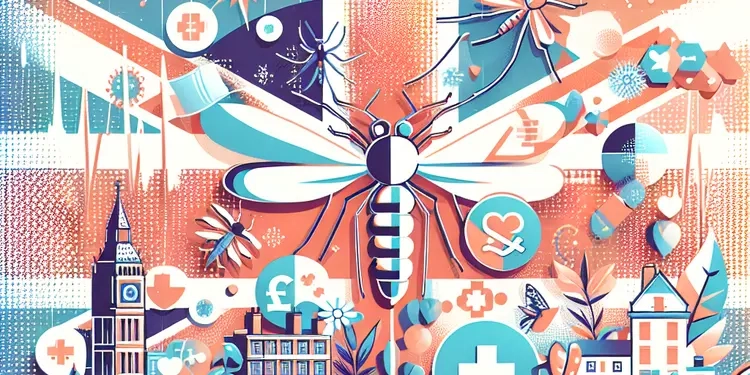
What diseases are spread by mosquitos in the UK in 2025?
Relevance: 67%
-

Will climate change affect the 2026 flu season?
Relevance: 67%
-

Are any vaccines available in the UK for mosquito-borne diseases?
Relevance: 64%
-

Is climate change affecting sewage pollution levels?
Relevance: 62%
-
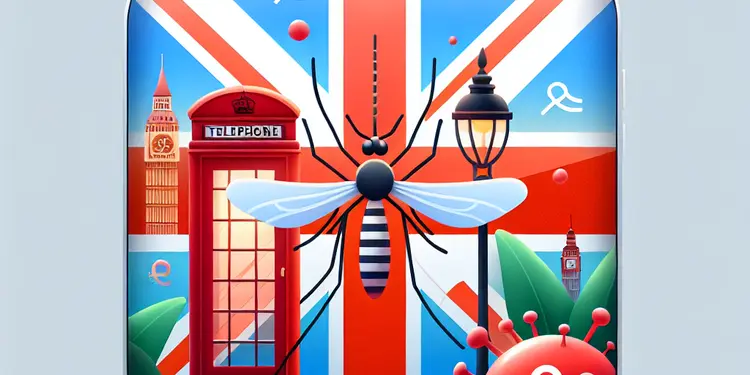
Can mosquitoes transmit any bacterial diseases in the UK?
Relevance: 62%
-

How does climate change affect pollen levels?
Relevance: 60%
-
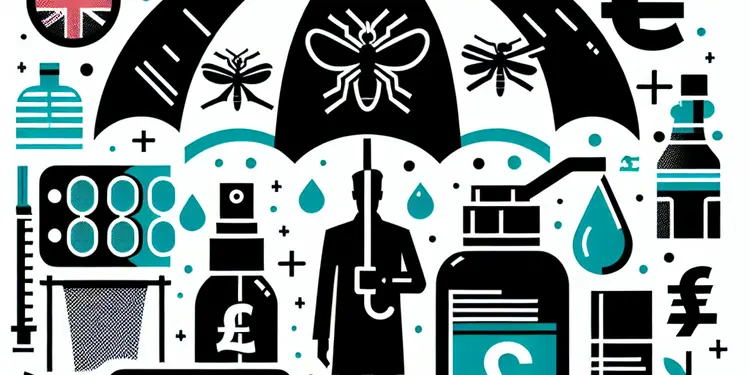
What measures are being taken to prevent mosquito-borne diseases in the UK?
Relevance: 60%
-

What should travelers to the UK know about mosquito-borne diseases?
Relevance: 59%
-

How does climate change affect water infrastructure maintenance?
Relevance: 57%
-
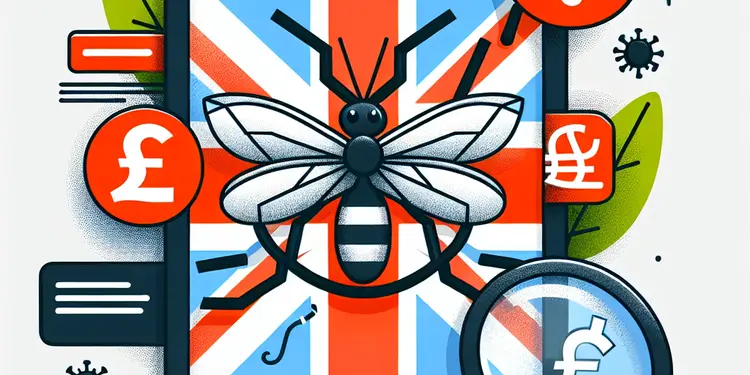
Do all mosquitoes in the UK carry diseases?
Relevance: 56%
-
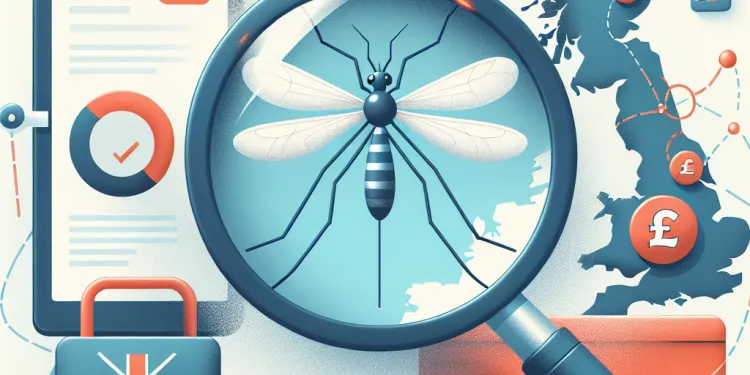
Are there any government initiatives to control mosquitoes in the UK?
Relevance: 42%
-
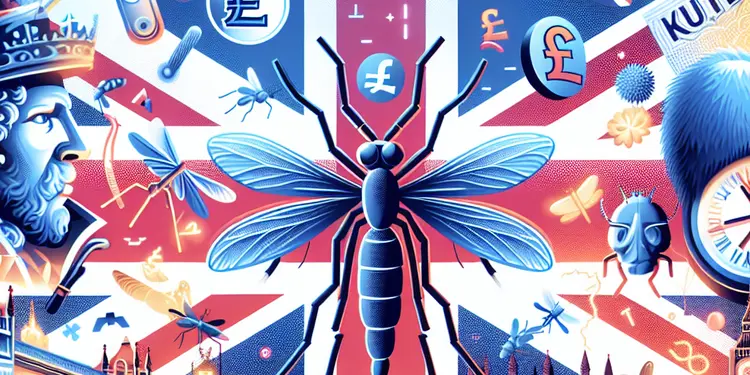
Is there a risk of yellow fever being spread by mosquitoes in the UK?
Relevance: 42%
-

What role do climate change and weather play in water infrastructure issues?
Relevance: 42%
-
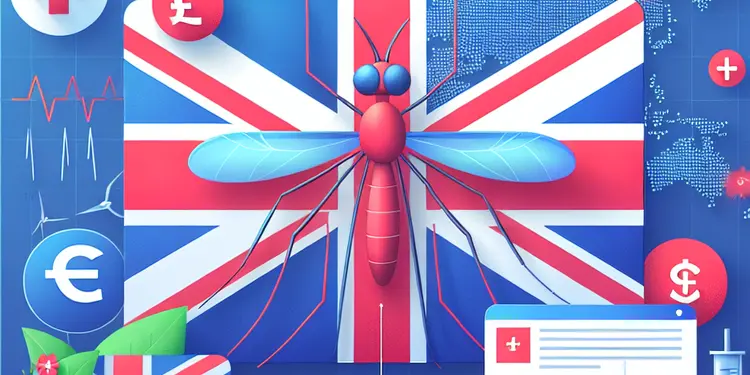
Can dengue fever be contracted in the UK?
Relevance: 41%
-

Can lifestyle changes help manage Huntington's disease?
Relevance: 37%
-
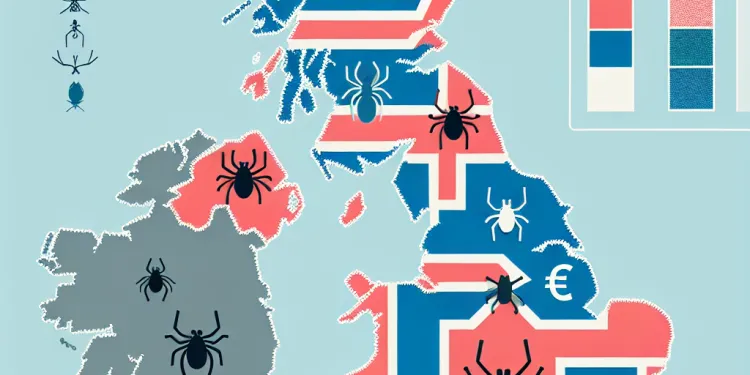
Where is Lyme disease most commonly found?
Relevance: 36%
-

Can lifestyle changes reduce the need for medication for heart disease prevention?
Relevance: 36%
-

What dietary changes can help manage Crohn's disease?
Relevance: 36%
-

Is UK air quality changing?
Relevance: 35%
-

Can lifestyle changes impact motor neurone disease progression?
Relevance: 35%
-

Are UK mosquitoes capable of transmitting Zika virus?
Relevance: 35%
-

Are there mosquitoes in the United Kingdom?
Relevance: 34%
-

Raynaud's Disease
Relevance: 33%
-

Can screw worms cause zoonotic disease?
Relevance: 32%
-

How prevalent is West Nile virus in the UK?
Relevance: 30%
-

Liver disease | NHS
Relevance: 30%
-
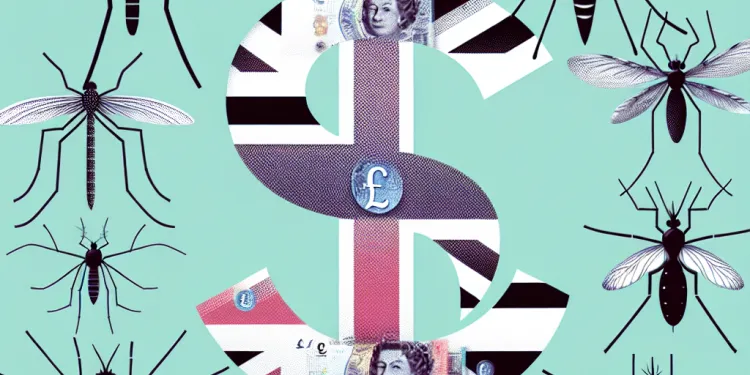
What types of mosquitoes are found in the UK?
Relevance: 29%
-

Is Huntington's disease fatal?
Relevance: 29%
-

What is Parkinson's disease?
Relevance: 29%
-

Is there a cure for Crohn's disease?
Relevance: 29%
-

What are the symptoms of Huntington's disease?
Relevance: 29%
-

What is Alzheimer's disease?
Relevance: 29%
Understanding Climate Change and Its Impact on Mosquito-Borne Diseases in the UK
In the UK, the risk and spread of mosquito-borne diseases are increasingly under scrutiny due to climate change. While these diseases have traditionally been associated with tropical regions, changing climatic conditions could pose new challenges for the UK, making it crucial to examine how these shifts affect the prevalence and reach of mosquito populations.
Impact of Rising Temperatures
One of the primary ways climate change affects mosquito-borne diseases is through rising temperatures. As the UK experiences warmer springs and summers, conditions become more favorable for mosquitoes to thrive. Higher temperatures accelerate mosquito lifecycles, increasing their breeding rates and population sizes. This growth in mosquito populations elevates the potential for local transmission of diseases like West Nile virus, a concern as non-native mosquito species, which can transmit the virus, expand northwards from mainland Europe.
Changes in Rainfall Patterns
Climate change also alters rainfall patterns, which significantly impacts mosquito habitats. Increased precipitation can create more standing water sources, essential for mosquito breeding. Conversely, prolonged dry spells could lead to the drying up of such habitats, but flexible species that adapt to changing environments could still proliferate. This variability in rainfall provides new breeding and living opportunities for mosquitos, making vigilance crucial to preventing possible outbreaks.
Adaptation of Mosquito Species
In the wake of climate changes, certain mosquito species are adapting to new environments. Historically, the UK has not been a fertile ground for mosquito-borne diseases, but the warming climate may allow more exotic species to survive and colonize. This could lead to the introduction of diseases such as dengue fever and chikungunya, traditionally confined to warmer climates. Recent summers have highlighted such possibilities with increased sightings of the Asian tiger mosquito, a known vector for these diseases.
Implications for Public Health
The potential spread of mosquito-borne diseases due to climate change carries significant public health implications. It necessitates enhanced monitoring and control efforts to detect and manage mosquito populations effectively. Public health strategies must include improving surveillance systems and investing in research to understand the ecology of potential vector species and the diseases they may carry. Additionally, public education campaigns will be crucial in raising awareness about preventive measures, such as reducing standing water around homes and using insect repellents when outdoors.
Conclusion
While the UK's temperate climate has historically limited the spread of mosquito-borne diseases, climate change is quickly altering this landscape. By understanding the potential risks and making concerted efforts to monitor and manage mosquito populations, the UK can better prepare for and mitigate the impacts of climate changes on health. Proactive approaches will be essential in safeguarding public health and addressing the challenges posed by these evolving environmental conditions.
Understanding Climate Change and Its Impact on Mosquito-Borne Diseases in the UK
In the UK, more people are worried about diseases spread by mosquitoes because of climate change. In the past, these diseases were mostly in hot countries. But because the weather is changing, the UK might face new problems. It's important to see how warmer weather affects mosquitoes and the diseases they carry.
Impact of Rising Temperatures
Climate change makes the UK warmer in spring and summer. This warmer weather is good for mosquitoes. They grow and spread more quickly when it's hot. More mosquitoes can mean more illness from things like the West Nile virus. This is because some mosquitoes that carry this virus are coming from Europe to the UK.
Changes in Rainfall Patterns
Climate change also changes the pattern of rain. This affects where mosquitoes can live. More rain creates places with standing water where mosquitoes can lay eggs. Sometimes, less rain can dry these places up. But some mosquitoes can adapt and still survive. This change in rain needs us to be careful to stop disease outbreaks.
Adaptation of Mosquito Species
Because of changes in the weather, some mosquitoes are living in new places. The UK wasn't known for mosquito diseases before. But with the weather getting warmer, new types of mosquitoes might arrive. These mosquitoes could bring diseases like dengue fever and chikungunya, which are usually in hot countries. The Asian tiger mosquito, which can carry these diseases, has been seen more often in the UK recently.
Implications for Public Health
Climate change might lead to more diseases from mosquitoes. This is a big worry for health. We need to watch mosquitoes closely and control their numbers. Health plans should include better ways to track these insects. It's also important to teach people how to stop mosquitoes, like by getting rid of standing water and using insect spray.
Conclusion
The UK used to have fewer problems with mosquito diseases. But with climate change, this is changing fast. By paying attention to the risks and carefully watching mosquito numbers, the UK can be ready and can reduce health risks. It's important to work hard to keep people safe from the health problems caused by these changes in the environment.
Frequently Asked Questions
Useful Links
Have you found an error, or do you have a link or some information you would like to share? Please let us know using the form below.
-->
This website offers general information and is not a substitute for professional advice.
Always seek guidance from qualified professionals.
If you have any medical concerns or need urgent help, contact a healthcare professional or emergency services immediately.
Some of this content was generated with AI assistance. We’ve done our best to keep it accurate, helpful, and human-friendly.
- Ergsy carfully checks the information in the videos we provide here.
- Videos shown by Youtube after a video has completed, have NOT been reviewed by ERGSY.
- To view, click the arrow in centre of video.
- Most of the videos you find here will have subtitles and/or closed captions available.
- You may need to turn these on, and choose your preferred language.
- Go to the video you'd like to watch.
- If closed captions (CC) are available, settings will be visible on the bottom right of the video player.
- To turn on Captions, click settings .
- To turn off Captions, click settings again.
More Items From Ergsy search
-

How do climate changes affect mosquito-borne diseases in the UK?
Relevance: 100%
-

Is there a season when mosquito-borne diseases are more likely in the UK?
Relevance: 93%
-

What research is being conducted on mosquito-borne diseases in the UK?
Relevance: 92%
-

Are there any new mosquito-borne diseases emerging in the UK in 2025?
Relevance: 90%
-

What regions of the UK are most affected by mosquito-borne diseases?
Relevance: 89%
-

What symptoms should I watch for if I suspect a mosquito-borne disease?
Relevance: 76%
-

Are climate changes affecting mosquito populations in the UK?
Relevance: 76%
-

Do UK mosquitoes carry diseases?
Relevance: 68%
-

What diseases are spread by mosquitos in the UK in 2025?
Relevance: 67%
-

Will climate change affect the 2026 flu season?
Relevance: 67%
-

Are any vaccines available in the UK for mosquito-borne diseases?
Relevance: 64%
-

Is climate change affecting sewage pollution levels?
Relevance: 62%
-

Can mosquitoes transmit any bacterial diseases in the UK?
Relevance: 62%
-

How does climate change affect pollen levels?
Relevance: 60%
-

What measures are being taken to prevent mosquito-borne diseases in the UK?
Relevance: 60%
-

What should travelers to the UK know about mosquito-borne diseases?
Relevance: 59%
-

How does climate change affect water infrastructure maintenance?
Relevance: 57%
-

Do all mosquitoes in the UK carry diseases?
Relevance: 56%
-

Are there any government initiatives to control mosquitoes in the UK?
Relevance: 42%
-

Is there a risk of yellow fever being spread by mosquitoes in the UK?
Relevance: 42%
-

What role do climate change and weather play in water infrastructure issues?
Relevance: 42%
-

Can dengue fever be contracted in the UK?
Relevance: 41%
-

Can lifestyle changes help manage Huntington's disease?
Relevance: 37%
-

Where is Lyme disease most commonly found?
Relevance: 36%
-

Can lifestyle changes reduce the need for medication for heart disease prevention?
Relevance: 36%
-

What dietary changes can help manage Crohn's disease?
Relevance: 36%
-

Is UK air quality changing?
Relevance: 35%
-

Can lifestyle changes impact motor neurone disease progression?
Relevance: 35%
-

Are UK mosquitoes capable of transmitting Zika virus?
Relevance: 35%
-

Are there mosquitoes in the United Kingdom?
Relevance: 34%
-

Raynaud's Disease
Relevance: 33%
-

Can screw worms cause zoonotic disease?
Relevance: 32%
-

How prevalent is West Nile virus in the UK?
Relevance: 30%
-

Liver disease | NHS
Relevance: 30%
-

What types of mosquitoes are found in the UK?
Relevance: 29%
-

Is Huntington's disease fatal?
Relevance: 29%
-

What is Parkinson's disease?
Relevance: 29%
-

Is there a cure for Crohn's disease?
Relevance: 29%
-

What are the symptoms of Huntington's disease?
Relevance: 29%
-

What is Alzheimer's disease?
Relevance: 29%


